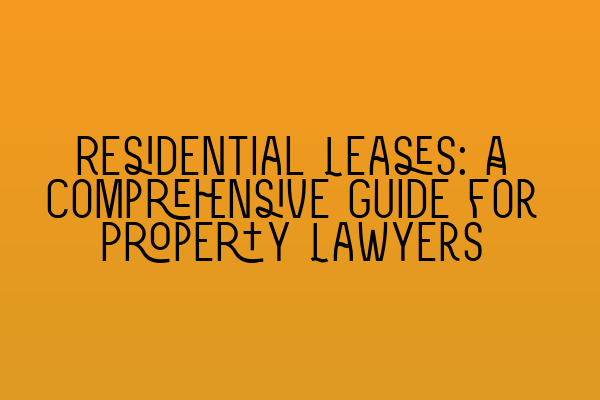Residential Leases: A Comprehensive Guide for Property Lawyers
Welcome to SQE Property Law & Land Law, where we provide expert legal advice and services for both property owners and tenants. In this comprehensive guide, we will delve into the intricacies of residential leases and provide valuable insights for property lawyers. Whether you are a novice or seasoned professional, this guide will help you navigate through the complexities of residential leases with ease.
Understanding Residential Leases
A residential lease is a legally binding contract between a landlord and a tenant that outlines the rights and obligations of each party. It governs the terms of occupancy, rent payment, maintenance responsibilities, and other essential aspects related to a residential property. As a property lawyer, it is essential to have a solid understanding of residential leases to effectively represent your clients.
When drafting or reviewing a residential lease, it is crucial to ensure that all necessary provisions are included. These provisions typically cover the following aspects:
- Rent Payment: The lease should clearly specify the amount of rent, the due date, and the mode of payment. It is advisable to include provisions for late rent payment and consequences for non-payment.
- Security Deposit: Establishing the amount and terms of the security deposit is essential. The lease should mention when the deposit will be returned and under what circumstances deductions can be made.
- Duration of Lease: Specify the start and end dates of the lease agreement. Additionally, consider including provisions related to lease renewal and termination.
- Responsibilities: Clearly define the responsibilities of both the landlord and the tenant. This should include maintenance and repair obligations, utility payments, and property-specific responsibilities.
- Restrictions: Outline any restrictions on the use of the property, such as pet policies, noise regulations, or limitations on alterations to the premises.
- Termination: Include provisions for termination of the lease, such as notice periods and grounds for eviction.
Key Considerations for Property Lawyers
As a property lawyer, staying up-to-date with the latest legal developments and best practices is crucial when dealing with residential leases. Here are a few key considerations to keep in mind:
- Legislation: Familiarize yourself with the relevant legislation governing residential leases in your jurisdiction. Understanding the legal framework will help ensure that lease agreements comply with the law.
- Lease Negotiations: Act as a mediator between landlords and tenants during lease negotiations. Advise your clients on their rights and obligations while finding common ground to facilitate a fair and mutually beneficial agreement.
- Due Diligence: Conduct thorough due diligence to uncover any hidden issues or problematic clauses in the lease agreement. This includes reviewing property records, checking for compliance with building regulations, and identifying potential disputes.
- Dispute Resolution: In the unfortunate event of a dispute between the landlord and the tenant, offer your clients expert guidance on dispute resolution methods, such as mediation or arbitration. Your goal should be to resolve the dispute efficiently and cost-effectively.
The Importance of SEO for Property Lawyers
In today’s digital age, having an online presence is vital for any business, including law firms. If you want to attract more clients and establish your expertise in residential lease law, you need to invest in search engine optimization (SEO).
SEO helps your website rank higher in search engine results, making it more visible to potential clients. By strategically incorporating relevant keywords, such as “residential lease lawyer” or “property lease attorney,” into your website content, you increase your chances of being found by individuals seeking legal assistance in this area.
To maximize your SEO efforts, it’s important to create high-quality, informative content that appeals to both search engines and human readers. By following SEO best practices and continuously updating your website with fresh, relevant content, you can improve your online visibility and attract a steady stream of potential clients.
Take Your Property Law Practice to the Next Level with SQE
At SQE Property Law & Land Law, we are committed to helping property lawyers excel in their field. We offer a wide range of resources, courses, and practice materials to assist you in preparing for the SRA’s Solicitors Qualifying Examination (SQE). Whether you need practice exam questions or comprehensive preparation courses for SQE 1 or SQE 2, we have you covered.
Preparing for the SQE is an essential step in advancing your career as a property lawyer. Our expert tutors and comprehensive study materials will equip you with the knowledge and skills needed to ace the SQE and excel in your legal practice.
Not sure where to start? Check out our related articles:
- SQE 1 Practice Exam Questions
- SQE 1 Practice Mocks FLK1 FLK2
- SQE 2 Preparation Courses
- SQE 1 Preparation Courses
- SRA SQE Exam Dates
By leveraging our resources and expertise, you can enhance your knowledge, build confidence, and take your property law practice to new heights. Let SQE Property Law & Land Law be your trusted partner in achieving professional success.
Ready to become a top-notch property lawyer? Contact us today!
Disclaimer: This blog post is intended for informational purposes only and should not be considered legal advice. Always consult with a qualified legal professional before making any decisions or taking any actions based on the information provided herein.
